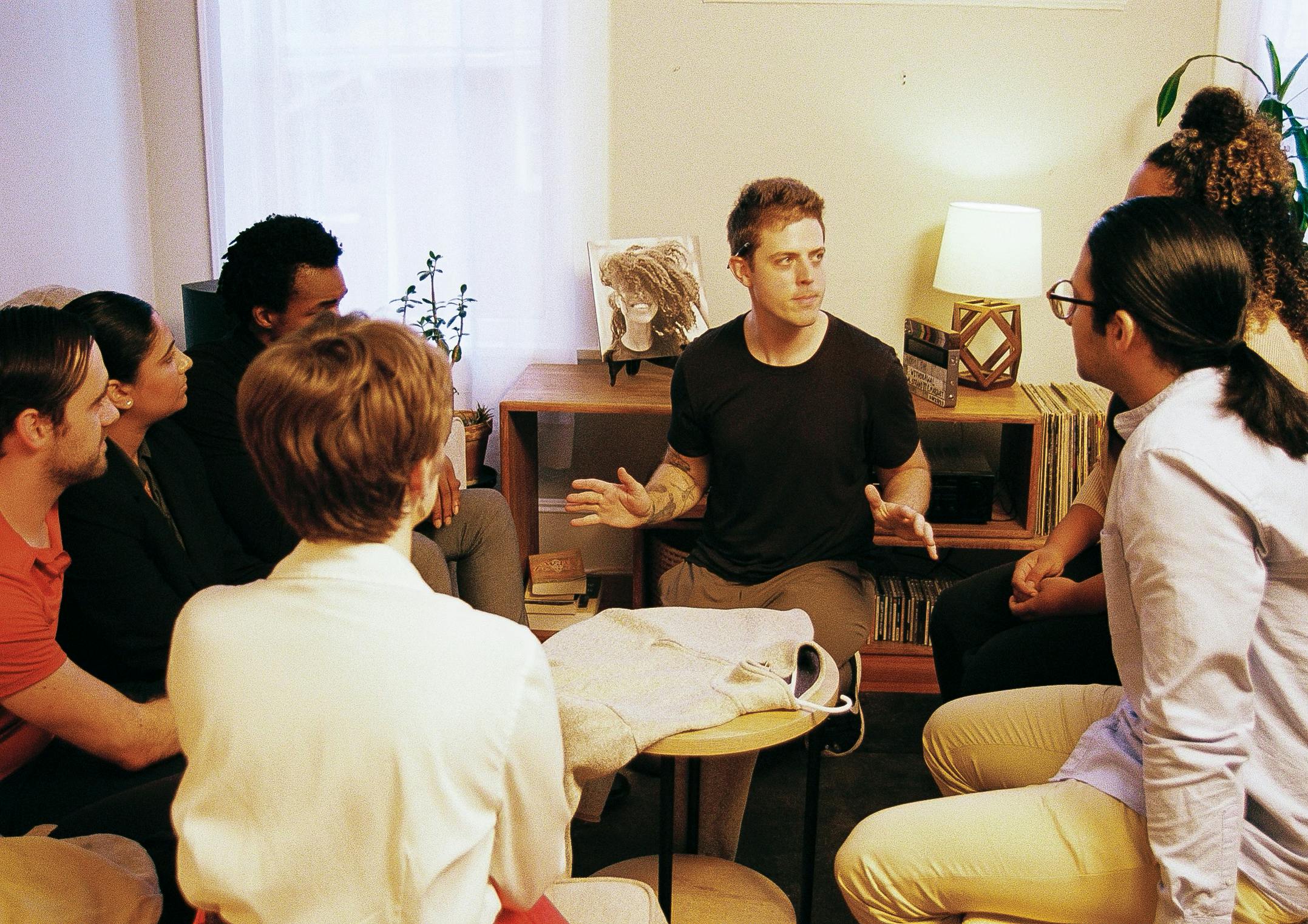In 2016, Aaron Strand did a reading at 7 Stages for their “Homebrew” series. He sat at a table with a group of other Georgia-based actors, in the small black room nestled behind Java Lords, and read a script. To be frank, the script was not nearly as memorable as Strand’s read of it. At the time, I was working as a volunteer archivist for the theater, and attended the event to help out with the general programming lift. I was a young and enthusiastic graduate student, completely unaware of the fact that I was an alcoholic and substance addict.
Fast forward to 2019, no longer the young twenty-four year old I was when first seeing Strand, I had finished graduate school and was now slinging coffee and cleaning toilets with a Master’s degree. I was still in active addiction and losing all hope. While behind the barista bar, in came Strand, put together and kindly asking for a cup of joe.
“I recognize you,” I said assuredly. “Do you act?”
“Yeah,” he said with enthusiasm. “I used to!”
We went down memory lane in just a few minutes and swapped phone numbers to keep in touch.
Today, I am a grateful recovering addict and part of that gratitude is extended to Strand who kept in touch with me throughout my journey into early sobriety. What I hadn’t known until early sobriety, was that Strand and I shared bits and pieces of the same story of being addicted to substances.
In 2022, I started pulling myself out of the ruin of being deep in addiction for most of my life. I registered my formerly small community gathering, ATLFilmParty, as an LLC, and around the same time, Strand started a film history podcast and began pre-production for his feature film entitled, “Withdrawal.”
Anytime I engage with Strand, he’s always game to assist with my projects, as I am with his. So, naturally, as “Withdrawal” is in the process of reaching its crowdfunding goal to finish post-production, I gave him a call and asked if I could tell his hero’s journey – from the building of his now lauded podcast, to his feature filmmaking endeavor, and the way eleven years of sobriety have allowed him to do it all with grace and community in mind.
“I’m a writer, director, podcaster, and just a general degenerate cinephile,” Strand started the conversation over a virtual interview with AFPZine. “Ever since childhood, I’ve been that kid who obsessively reads biographies about old artists.”
“I was on a walk with my daughter in the stroller one day, and the idea just popped into my head: ‘Obviously I should turn my obsessive biography reading into a podcast,’” Strand took me to the inception of “Behind the Slate.”
“I started with what turned into a five part, twelve and a half hour history series of Charlie Chaplin…but it’s honestly just a space for me to nerd out about this medium that I care so much about,” explained Strand. “Whenever I watch a movie, I’m that guy who is pulling up my phone – not to read the plot of the film – but to read about what period this film emerged from.”
“Learning about the historical context of whenever a film was made…makes that film come so much more alive,” added Strand. “The podcast is designed to provide that experience to people.”
Fortunately, with the help of community members like The Historic Plaza Theatre, “Behind the Slate” now has a bimonthly live show at the historical theater off Ponce called, “Behind the Slate Presents.”
“The response has been really amazing,” said Strand. “That works in concert with my creative endeavors…after eleven years of really dedicated work to building myself up to be ready for this, I finally have a feature film.”
“Withdrawal” is a raw and heartfelt love story about two star crossed lovers struggling with heroin addiction in Athens, Georgia. It is influenced by Strand’s personal experience with addiction. It’s no coincidence that Strand has also been sober for those aforementioned eleven years.
In his late teens and early twenties, Strand never dreamed of a life in Georgia with the beautiful family he is husband and father to today.
“I started off as an actor. I went to NYU drama for acting, and I had a lot of success early in my career working in theater in New York…I was a drug addict and I ended up burning it all down and bottoming out in New York City. I was homeless for a time and addicted to dope,” Strand recalled.
By the time everything went to hell, including Strand, he was forced to return to his hometown of Athens, Georgia to live with his parents and recover from heroin addiction.
“In early sobriety, I was going to movies trying to figure out what happened to me,” he told AFPZine. “I was diving into this world of art house cinema; watching a lot of stuff like Lars von Trier, Kurosawa, and Tarkovsky and the sort of stalwarts of art house film that I hadn’t watched earlier in my life. It was engaging with these movies that was giving me hope.”
Up until this point, Strand had to decide how he was going to continue engaging with the art form of cinema and theater. “It prompted me to borrow my mom’s camera that shot video and start going into town, filming random stuff…it was that spirit that carried me all the way here eleven years later.”
While Strand was enamored with the films about addiction he was delving into, they just didn’t apply to the modern day horrors of substance abuse. So, after several years in recovery, Strand put pen to paper and wrote the feature-length script for “Withdrawal.”
“I wasn’t seeing my experience reflected on the screen,” Strand stated. “The opioid epidemic and drug addiction is the number one cause of death for Americans between the age of 25 and 50; not gun violence, not car crashes – overdoses. This is a major problem that is affecting all of us and our society, so by sharing this story about two young people with hopes and dreams who have gotten caught up in this codependent cycle of addiction, I really hope to humanize this issue and put a face on it and take people inside what it’s like.”
Ultimately, Strand’s main goal is to humanize the addiction experience.
“It is so easy in our everyday life to dehumanize struggling with addiction. It’s easy because people struggling with addiction often do things that are hard for people who aren’t struggling with addiction to understand – they do things that are deemed selfish, self-centered, and dangerous…so it’s easy to stigmatize, but stigma is just a soft word for discrimination.”
However, “Withdrawal” isn’t a movie solely focused on the drama of addiction. It also incorporates comedy.
“Drug addicts are hilarious in a certain sense, right? I had an acting teacher who described comedy to me, and it was one of the best definitions I’ve ever gotten. They said, ‘Comedy is the shameless pursuit of an objective,’” Strand recounted. “There is no one more shameless in the pursuit of their objective than a f*cking drug addict.”
Furthermore, romance is at the core of “Withdrawal.” It is a true love story.
“The beautiful thing about a love story is that the audience can’t help but root for love. We just naturally do it,” Strand explained. “So, I want the audience to root for these guys. I want them to want them to make it through their ordeal of addiction.”
With a primarily Georgia cast and crew, Strand’s “Withdrawal” crowdfunding efforts align with AFP’s goals for more homegrown films at the forefront of our entertainment industry. Therefore, if you’re willing and able to donate to Strand’s film, we invite you to visit the "Withdrawal" Seed and Spark page. If you are not able, we implore readers to follow “Withdrawal” on Instagram to follow along on its journey to finishing and its future in the festival circuits.
*BTS photography credited to Mollie Robertson

